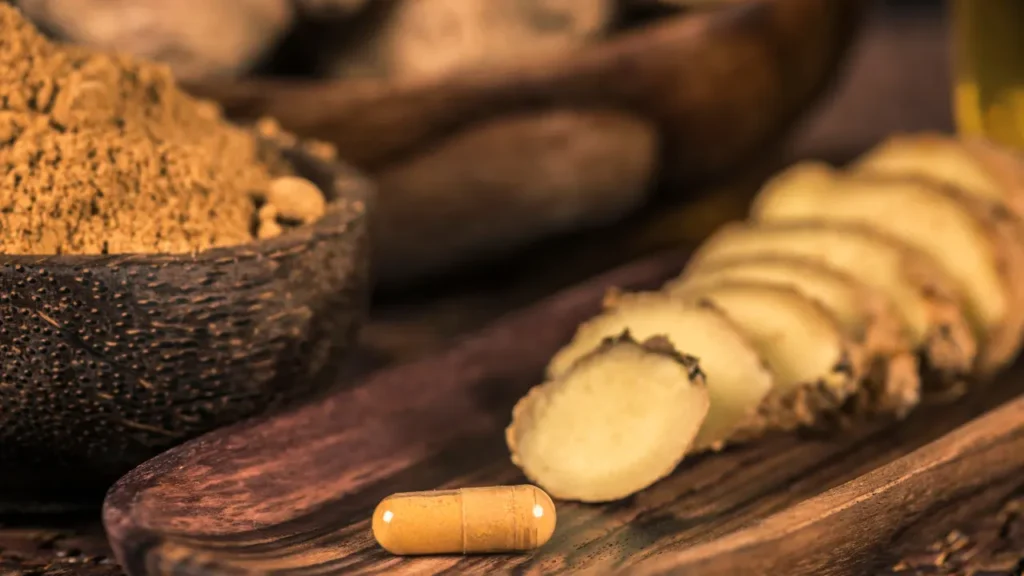Zingiber officinale (commonly known as ginger) has won praise for its unique flavor, scent, and host of possible health advantages. This perennial herbaceous plant, which has its roots in Southeast Asia, has spread around the world thanks to its many uses in traditional medicine, food, and nutritional supplements. This article provides a thorough analysis of ginger, including its properties, advantages for health, recommended dosage, possible negative effects, possible drug interactions, and methods of action on the body and brain.
You May Also Like:
Five Great Reasons to Try a Nootropic Mushroom Supplement
Levium Premium Liquid Fast-Acting Natural Stress Relief Supplement: In-Depth Review
Ginger: Benefits, Dosage, Side Effects, Drug Interactions, and Other Important Information is an original (NootropicsPlanet) article.
Nature of Ginger
Ginger is included in the zingiberaceae family, which also includes well-known spices like cardamom and turmeric. The plant’s rhizome, a substantial subterranean stem from which roots and shoots sprout, is responsible for its therapeutic effects. Its knotty, beige skin and fibrous, juicy inside define this rhizome, which we generally call “ginger.”
Ginger’s phytochemistry is highly complex, and its main bio-active components include gingerols, shogaols, paradols, and zingerone. These substances, which give ginger its pungency, have undergone substantial pharmacological research. The main pungent substances in fresh ginger are gingerols, especially 6-gingerol. These substances can change into shogaols, which are two times as pungent, when dried or heated.
Health Benefits of Ginger
Due to its antioxidative, anti-inflammatory, and anticarcinogenic properties, ginger has the potential to be therapeutic in many areas of health. According to research, ginger is useful for treating illnesses including nausea and vomiting caused by pregnancy, chemotherapy, and surgery. Due to its anti-inflammatory properties, it also helps treat osteoarthritis by lowering pain and inflammation.
In preclinical research, ginger’s 6-gingerol also shows anticarcinogenic properties by preventing the development of certain cancer cells. Ginger can also be advantageous for cardiovascular health. It can be beneficial for diabetics because it can lower blood cholesterol, stop blood clotting and platelet aggregation, and help regulate blood sugar levels.

Chemistry of Ginger
Phenolic compounds, such as gingerols, shogaols, paradols, and zingerone, are the main bio-active components of ginger. The primary active ingredients in fresh ginger are gingerols, especially 6-gingerol, which gives it its strong flavor and potent pharmacological properties. Dehydration can cause gingerols to change into shogaols, which are roughly twice as pungent and have the same powerful biological action as gingerols.
When gingerols are cooked, a less flavorful molecule called gingerone is created. Zingerone has shown potential pharmacological properties in various trials despite having lost some of its pungency. Terpenoids, such zingiberene, which have been recognized as active components with medicinal potential, are another component of ginger.
Physiological Properties of Ginger
The antioxidative, anti-inflammatory, and anticarcinogenic properties of ginger, which are fueled by its bio-active components, account for the majority of its health advantages. These properties offer a wide range of health advantages, from protection for the nervous system to gastrointestinal health.
The components in ginger reduce inflammation and free radicals. Ginger is a strong natural antioxidant and anti-inflammatory agent because of the 6-gingerol and 6-shogaol components that have been shown to reduce the body’s production of pro-inflammatory cytokines and reactive oxygen species (ROS). These processes can defend cells against oxidative stress and inflammation, which are linked to a number of illnesses, including cancer and arthritis.
Pre-clinical research has revealed that 6-gingerol can prevent the development and division of several cancer cell types, including breast, ovarian, and colon cancer cells. The ability of 6-gingerol to cause apoptosis (programmed cell death) in cancer cells and prevent angiogenesis (the growth of new blood vessels that feed tumors) is assumed to be the cause of its anticarcinogenic effect.
Neuroprotective Properties: It is thought that ginger’s anti-inflammatory and anti-oxidant properties also have neuroprotective effects. Ginger has the potential to decrease the course of neurodegenerative illnesses like Alzheimer’s and Parkinson’s by lowering oxidative stress and inflammation in the brain. Ginger may improve cognitive performance and have anxiolytic (anxiety-reducing) benefits, according to several studies.
Health of the Gastrointestinal Tract: Ginger has a long history of use in the treatment of many digestive disorders. Its ability to promote stomach emptying and the release of digestive enzymes, lessen inflammation and oxidative stress in the gastrointestinal system, and modify signaling pathways that lessen nausea and vomiting are thought to be the reasons for its usefulness.


Optimal Dosage of Ginger
The ailment being treated, your overall health status, age, and whether ginger is being ingested naturally or as a supplement are all factors that might affect the ideal dose. Adult doses may generally be regarded safe and effective for the majority of therapeutic purposes with 1 to 3 grams of ginger powder daily.
The following doses have been used in studies by scientists for particular conditions: For osteoarthritis, 250 mg to 1 gram of ginger extract in split doses daily; for post-operative nausea and vomiting, 1 gram of ginger before surgery. These dosages range from 650 mg to 1 gram daily in divided doses for up to 4 days. A doctor’s consultation is always necessary.
Side Effects of Ginger
Although ginger is usually thought to be safe to eat, some people can have negative side effects such as heartburn, diarrhea, and stomach pain. Allergic responses might happen on occasion. Ginger should be taken cautiously in patients with bleeding problems or those taking anticoagulants or anti-platelet drugs due to its anti-platelet properties since it can increase the risk of bleeding.
Potential Substance Interactions
Certain medicines and ginger may not interact well. For example, it can interact with medications used to treat diabetes, intensifying their effects and perhaps resulting in hypoglycemia. Additionally, it may interact with drugs prescribed for high blood pressure, raising the risk of low blood pressure or an irregular heartbeat. Before introducing ginger into your routine, always talk about potential interactions with a healthcare professional.


Best Responsible Use
The many health advantages of ginger, together with its widespread use in cooking, make it an interesting research topic. Although its potential as a nutritional supplement is excellent, it’s important to take into account any side effects and any drug interactions. As our knowledge of ginger’s chemistry and physiological properties expand, it serves as a compelling example of how nature can be used to benefit our health and wellbeing.
Ginger:
Conclusion
The potential advantages of ginger for the brain are beginning to emerge from neurological studies. Ginger can prevent age-related brain deterioration and can even reduce the progression of neurodegenerative disorders like Alzheimer’s and Parkinson’s, according to research. This is an important scientific breakthrough. However, you must remember to talk to your doctor before starting a ginger supplement to make sure your body can tolerate it, and if it is right for you.


References:
- Gingerol content of diploid and tetraploid clones of ginger (Zingiber officinale Roscoe). Retrieved from: https://pubs.acs.org/doi/abs/10.1021/jf00065a018
- Anti-inflammatory and anti-oxidative effects of the green [6]-gingerol, [6]-shogaol and its metabolite, [6]-paradol. Retrieved from: https://www.sciencedirect.com/science/article/pii/S0944711307002206
- Anti-Oxidative and Anti-Inflammatory Effects of Ginger in Health and Physical Activity: Review of Current Evidence. Retrieved from: https://www.ncbi.nlm.nih.gov/pmc/articles/PMC3665023/
Important Note: The information contained in this article is for general informational purposes only, and should not be construed as health or medical advice, nor is it intended to diagnose, prevent, treat, or cure any disease or health condition. Before embarking on any diet, fitness regimen, or program of nutritional supplementation, it is advisable to consult your healthcare professional in order to determine its safety and probable efficacy in terms of your individual state of health.
Regarding Nutritional Supplements Or Other Non-Prescription Health Products: If any nutritional supplements or other non-prescription health products are mentioned in the foregoing article, any claims or statements made about them have not been evaluated by the U.S. Food and Drug Administration, and such nutritional supplements or other health products are not intended to diagnose, treat, cure, or prevent any disease.
